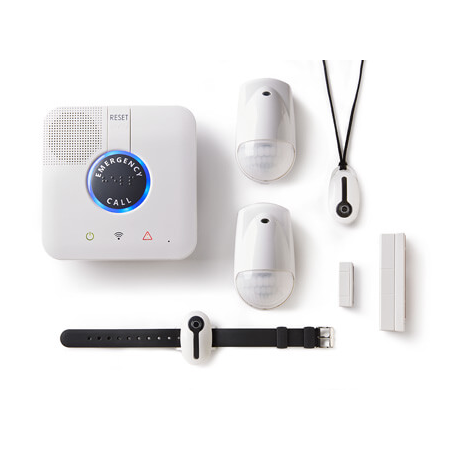Comprehensive Guide to the Best GPS Medical Alert Systems IN 2024
A GPS Medical Alert System is a type of medical alert device designed to provide a quick and efficient way for individuals, particularly seniors, to get help during a medical emergency.
Brio House is an independent review site. We may earn money when you click links inside our site.
A GPS Medical Alert System is a type of medical alert device designed to provide a quick and efficient way for individuals, particularly seniors, to get help during a medical emergency. These systems utilize Global Positioning System (GPS) technology to track the user’s location in real-time, making it possible for emergency services to find them quickly in case of an emergency.
These systems typically come in the form of wearable devices like necklaces or bracelets, but they can also be integrated into mobile devices. When activated, either manually by the user or automatically through features like automatic fall detection, the system sends a signal to a monitoring center. This center then contacts emergency services and provides them with the user’s exact location.
Importance of GPS Medical Alert Systems
GPS Medical Alert Systems are an essential tool for ensuring the safety and well-being of individuals who may be at risk of medical emergencies. This includes seniors, people with serious medical conditions, and those who live alone.
The primary advantage of these systems is their ability to provide immediate assistance when it’s most needed. In many medical emergencies, the speed of response can be a critical factor in determining the outcome. By providing real-time location tracking, these systems ensure that help can arrive as quickly as possible.
Moreover, GPS Medical Alert Systems offer peace of mind not only to the users but also to their family members and caregivers. Knowing that their loved ones can get help promptly in an emergency can alleviate a lot of worry.
Overview of the Article
In this article, we will delve deeper into the world of GPS Medical Alert Systems. We will explore how these systems work, their key features, and the benefits they offer. We will also look at some of the top GPS Medical Alert Systems available in the market today and discuss the factors you should consider when choosing a system for yourself or a loved one.
We will also address some frequently asked questions about these systems and share real-life stories from users. Finally, we will look at the future trends and innovations in GPS Medical Alert Systems.
Whether you’re considering getting a GPS Medical Alert System for yourself or a loved one, or you’re just curious about this technology, this article will provide you with a comprehensive understanding of these life-saving devices. So, let’s get started!

Understanding GPS Medical Alert Systems
How GPS Medical Alert Systems Work
GPS Medical Alert Systems are designed to provide a lifeline to help during emergencies. They work by integrating a variety of technologies, including GPS technology, cellular networks, and sometimes Wi-Fi, to provide real-time monitoring and location tracking.
When the user activates the system, either manually or automatically through features like automatic fall detection, the device sends a signal to a monitoring center. This signal includes the user’s exact location, determined through the GPS system in the device. The monitoring center then contacts emergency services, providing them with the user’s location and any other relevant information.
Key Features of GPS Medical Alert Systems
GPS Medical Alert Systems come with a variety of features designed to ensure the user’s safety. Here are some key features:
- Real-Time Location Tracking: This is the core feature of any GPS Medical Alert System. The system uses GPS technology to track the user’s location in real-time. This allows emergency services to find the user quickly in case of an emergency.
- Fall Detection: Many medical alert systems come with automatic fall detection. This feature uses sensors to detect if the user has fallen and automatically sends an alert to the monitoring center.
- Two-Way Communication: This feature allows the user to communicate directly with the monitoring center. This can be crucial in emergencies where the user is able to provide important information about their situation.
- Mobile Device Compatibility: Some GPS Medical Alert Systems can be integrated with mobile devices. This allows users to activate the system from their phone or other devices, providing additional flexibility and convenience.
Benefits of GPS Medical Alert Systems
GPS Medical Alert Systems offer several benefits:
- Quick Emergency Response: By providing the user’s exact location, these systems ensure that help can arrive as quickly as possible.
- Peace of Mind: These systems provide peace of mind to users and their families, knowing that help is just a button press away.
- Independence for Seniors: For seniors who live alone or lead active lifestyles, these systems allow them to maintain their independence while ensuring their safety.
- Useful in Various Situations: While these systems are often associated with medical emergencies, they can also be useful in other situations, such as if the user gets lost or in case of a personal security threat.
In the next sections, we will delve deeper into these features and benefits, and look at some of the top GPS Medical Alert Systems available in the market today.

How Do GPS Medical Alert Systems Work?
GPS medical alert systems work by using GPS technology to track the location of the user. When the alert button on the device is pressed, the system sends a signal to a monitoring center with the user’s location information.
What are the Best GPS Medical Alert Systems in 2024?
- Medical Guardian Medical Alert System
- HandsFree Health Medical Alert System
- Bay Alarm Medical Alert System
- MobileHelp Medical Alert System
- LifeFone Medical Alert System
- Lively Medical Alert System
- Medical Alert Medical Alert System
- Philips Lifeline Medical Alert System
- Alexa Together Medical Alert System
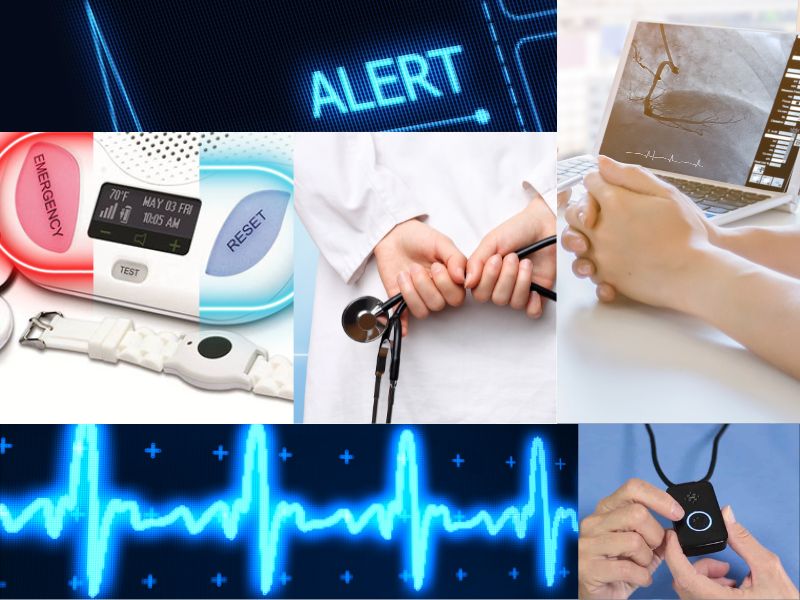
Top 9 GPS Medical Alert Systems in 2024
In this section, we will delve into the specifics of the top 9 GPS medical alert systems available in the market. We will discuss each system’s features, pros and cons, and pricing details.
1. Medical Guardian Medical Alert System
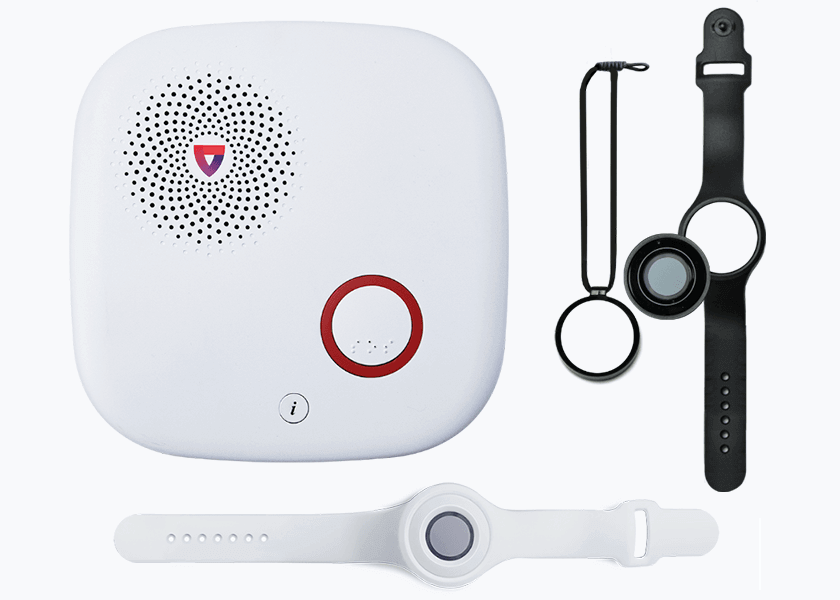
Medical Guardian Medical Alert System
Our Rating:

5.0
Medical Guardian offers a variety of medical alert systems with GPS. They have three models: the Mini Guardian, Mobile 2.0, and MGMove.
- Features: The Mini Guardian and Mobile 2.0 offer fall detection for an additional $10 per month. The MGMove is a smartwatch that provides a range of extra features, although some of the features do cost extra.
- Pros: One unique feature of the Mobile 2.0 is that, according to the company, it’s the only on-the-go device you can use to call for help while it’s charging.
- Cons: The MGMove does need to be charged every night, and it does not offer fall detection.
- Price: Starting monthly cost: $39.95. Battery life: 24 hours to seven days, depending on the model.
2. HandsFree Health Medical Alert System
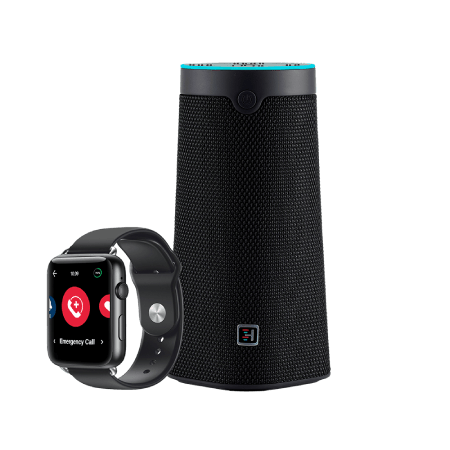
HandsFree Health Medical Alert System
Our Rating:

4.7
HandsFree Health offers the WellBe Smartwatch for older adults who are active, want a range of health and safety features that include GPS, and want a small, lightweight alert device.
- Features: The smartwatch includes most of the features you can find in traditional on-the-go systems. It also includes extra health features, like a step tracker and heart rate monitor.
- Pros: The WellBe Smartwatch also offers a feature that sets it apart from the other medical alert watches on the market: Using Bluetooth technology, you can pair your WellBe watch with the other Lively medical alert offering, the WellBe Virtual Health Assistant Smart Speaker (sold separately).
- Cons: It’s worth noting the WellBe Smartwatch does not include fall detection.
- Price: Starting monthly cost: $29.95. Battery life: 24 hours.
3. Bay Alarm Medical Alert System
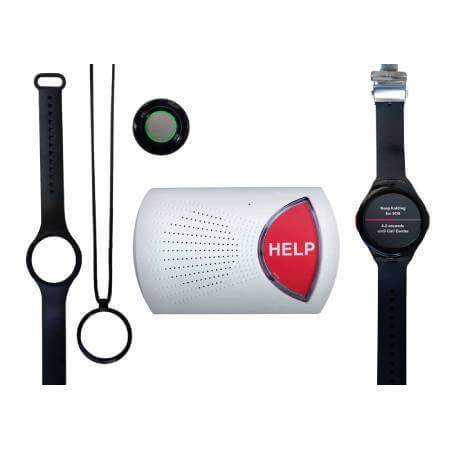
Bay Alarm Medical Alert System
Our Rating:

4.6
Bay Alarm Medical offers three medical alert systems with GPS: the SOS Mobile, SOS All-in-One, and SOS Smartwatch.
- Features: The SOS Mobile, you have the option of downloading the free Caregivers’ Tracking App. This app allows three contacts to determine a loved one’s location during an emergency and also receive notifications when weather is severe or the device battery is low.
- Pros: Its low prices earned it the designation of “Best Affordable Medical Alert System with GPS” by our Reviews Team.
- Cons: You will be required to buy the equipment一$99 for the SOS Mobile and SOS All-in-One and $159 for the SOS Smartwatch.
- Price: Starting monthly cost: $29.95. Battery life: 72 hours.
4. MobileHelp Medical Alert System
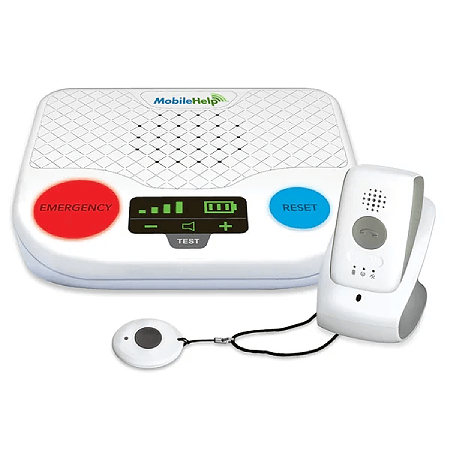
MobileHelp Medical Alert System
Our Rating:

4.7
MobileHelp offers a variety of bundled options. All of these bundled systems include at least one MobileHelp Solo, which is the company’s mobile device with GPS.
- Features: The Mobile Duo comes with two of everything you get with the Solo. This means you get the same mobile device that lets you call for help, along with GPS location detection一times two.
- Pros: The wide variety of bundling options earned MobileHelp the distinction of “Best Bundled Package with GPS.”
- Cons: But keep in mind that it’s larger and somewhat boxier than other devices we have seen.
- Price: Starting monthly cost: $34 for Mobile Solo / $42 for Mobile Duo. Battery life: 72 hours.
5. LifeFone Medical Alert System
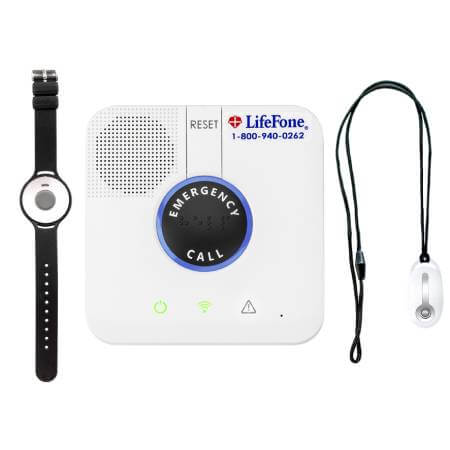
LifeFone Medical Alert System
Our Rating:

4.6
LifeFone offers two on-the-go systems with GPS: the VIP and VIPX. Its long-lasting batteries make it the “Best Battery in a Medical Alert System with GPS.”
- Features: The VIP and VIPX have other stand-out features. Both offer advanced location detection that uses Wi-Fi and cellular technology in addition to GPS for precise tracking. LifeFone also provides your choice of a connection through either AT&T or Verizon, depending on which signal is the strongest in your area. And, somewhat unique to the LifeFone brand, both devices provide vibration feedback for those who are hearing or vision impaired.
- Pros: The VIPX provides a few other extras too. First, it comes in three colors—black, white, and silver—and it’s very lightweight at only 1.3 ounces. The VIPX also includes optional built-in fall detection for an additional $10 per month, something not offered with the VIP.
- Cons: LifeFone has much to offer with its on-the-go devices, but the systems do come at a higher-than-average monthly cost: $44 for the VIP and $46 for the VIPX.
- Price: Starting monthly cost: $36.95. Battery life: 30 days for the VIP, 16 days for the VIPX, 30 hours for at home and on-the-go.
6. Lively Medical Alert System
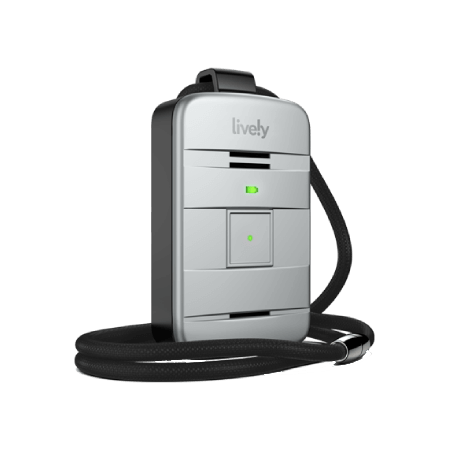
Lively Medical Alert System
Our Rating:

4.6
Lively specializes in on-the-go systems with GPS. For those older adults who are tech savvy or don’t want to wear a device, Lively is a great option. It’s different from all other systems we have reviewed in that two of the four of its most popular systems are cell phones.
- Features: The Jitterbug Smart3 is a smartphone, and the Jitterbug Flip2 is a flip cell phone. Both are easy to use and include the following features: Large screens and buttons, Cameras, Bluetooth connectivity, Hearing aid connectivity.
- Pros: Both phones also include GPS, allowing the monitoring center and selected contacts to access the user’s location.
- Cons: The Lively phones do not include fall detection, but the company does sell one other product—the Lively Mobile Plus—that does have this feature. The Lively Mobile Plus is the brand’s traditional on-the-go device.
- Price: Starting monthly cost: $14.99. Battery life: Up to four months (Lively Wearable2).
7. Medical Alert Medical Alert System
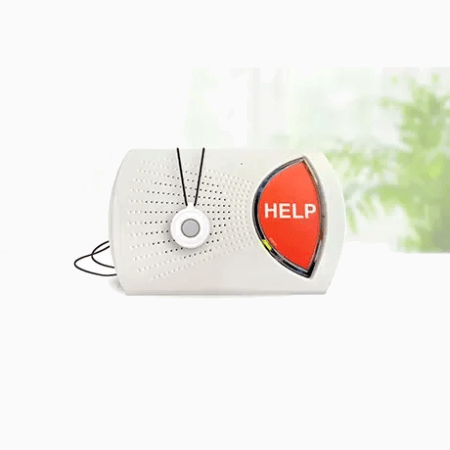
Medical Alert Medical Alert System
Our Rating:

4.6
Medical Alert offers two on-the-go systems with GPS: the On the Go and the On the Go + Home Fall Detection.
- Features: The On the Go + Home Fall Detection is a unique system that includes a mobile device and an at-home system with fall detection. The On the Go system is a traditional mobile device with GPS.
- Pros: Medical Alert offers a few features that make it stand out from other brands. First, it offers a free mobile app for caregivers and loved ones. This app provides real-time location tracking and notifications for emergencies and low battery levels.
- Cons: The On the Go + Home Fall Detection system is somewhat higher in price, at $42.95 per month. But, it does include fall detection, which is a $10 monthly fee with most other brands.
- Price: Starting monthly cost: $32.95. Battery life: 5 days.
8. Philips Lifeline Medical Alert System
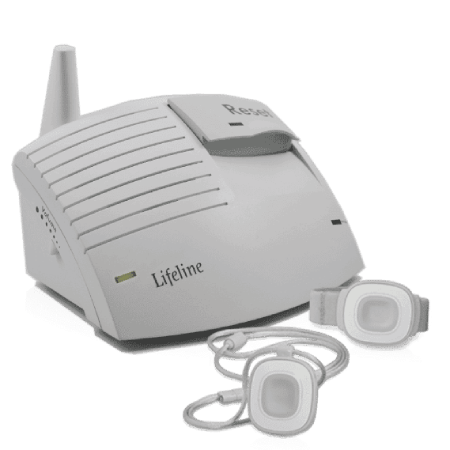
Philips Lifeline Medical Alert System
Our Rating:

4.6
Philips Lifeline offers two on-the-go systems with GPS: the GoSafe2 and the GoSafe.
- Features: The GoSafe2 is a traditional mobile device with GPS. The GoSafe is a unique system that includes a mobile device and an at-home system. Both systems include fall detection.
- Pros: Philips Lifeline is the only brand we have reviewed that includes fall detection with all of its on-the-go systems. This is a significant benefit, as many older adults are at risk of falling.
- Cons: The GoSafe2 and GoSafe are higher in price than other systems we have reviewed. The GoSafe2 is $54.95 per month, and the GoSafe is $64.95 per month. But, considering that fall detection is included, these prices are comparable to other brands that charge an additional $10 per month for this feature.
- Price: Starting monthly cost: $44.95. Battery life: 2-3 days.
9. Alexa Together Medical Alert System
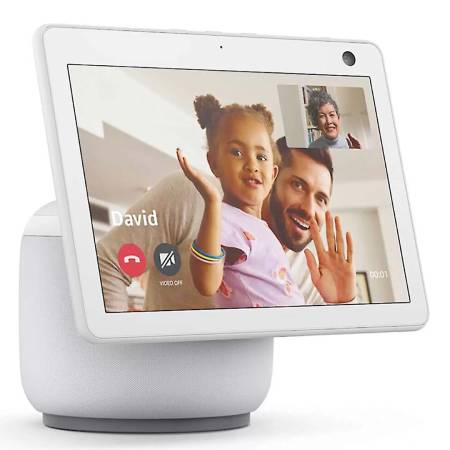
Alexa Together Medical Alert System
Our Rating:

4.6
Alexa Together is a unique solution for those who are tech-savvy and prefer a hands-free, voice-activated system. It is powered by Amazon’s Alexa and offers a 24/7 urgent response service accessible through voice commands. It offers a unique approach to GPS tracking in medical alert systems. It doesn’t have a traditional GPS feature, but it does offer location-based services through the Alexa app on a smartphone.
- Features: Alexa Together offers features such as video calling capabilities, in-depth features for caregivers, and adjustable privacy settings. It also has a range of up to 1,000 feet for voice detection, allowing the monitoring center and selected contacts to access the user’s location.
- Pros: Alexa Together offers a unique solution for those who prefer a hands-free, voice-activated system. It also provides a comprehensive set of features for caregivers, making it an excellent choice for those caring for loved ones.
- Cons: Alexa Together requires a stable internet connection to function effectively, which may not be available in all areas. Also, it does not include fall detection.
- Price: Starting monthly cost: $19.99. Battery life: Depends on the Alexa device used.
Factors to Consider When Choosing a GPS Medical Alert System
When it comes to choosing a GPS medical alert system, there are several factors you need to consider to ensure you’re making the best choice for your needs or those of your loved ones. Here are some key factors to keep in mind:
Affordability
- Cost: The cost of GPS medical alert systems can vary significantly depending on the features they offer. Some systems may have a higher upfront cost but lower monthly fees, while others may offer a lower initial cost but higher ongoing fees. It’s important to consider both the initial and ongoing costs when choosing a system.
- Contracts and cancellation policies: Some companies may require you to sign a contract for a certain period of time, while others offer month-to-month services. Be sure to check the company’s cancellation policy as well, as some may charge a fee if you decide to cancel your service before the end of your contract.
Features
- GPS tracking: This is a crucial feature for a GPS medical alert system. It allows the monitoring center to locate the user in case of an emergency, which can be particularly useful if the user is unable to communicate their location.
- Fall detection: Some systems come with automatic fall detection, which can automatically alert the monitoring center if a fall is detected. This can be a lifesaver, especially for users who may become unconscious or unable to press the alert button after a fall.
- Two-way communication: This feature allows the user to communicate directly with the monitoring center through the device. This can be crucial in emergency situations, as it allows the user to explain the situation and the responder to provide immediate assistance or advice.
- Mobile device compatibility: Some systems can be synced with a smartphone or other mobile device, allowing users or their caregivers to track their location, monitor their status, and receive alerts.
Battery Life
The battery life of a GPS medical alert system is another important factor to consider. Some devices need to be charged daily, while others can last several days on a single charge. A longer battery life can provide more convenience and peace of mind, as the user won’t have to worry about the device running out of power in the middle of an emergency.
Cellular Service and GPS Tracking Quality
The quality of the cellular service and GPS tracking can greatly affect the performance of the medical alert system. It’s important to choose a system that uses a reliable cellular network to ensure consistent coverage. The GPS tracking should also be accurate and reliable, allowing the monitoring center to quickly locate the user in case of an emergency.
Customer Service
Good customer service is crucial when choosing a GPS medical alert system. The company should have a responsive and helpful customer service team that can assist with any issues or questions you may have. Additionally, the monitoring center should be staffed with trained professionals who can respond quickly and effectively in an emergency.
Equipment Fees
Some companies may charge additional fees for the equipment, while others include the equipment cost in their monthly fees. Be sure to check whether there are any additional equipment fees before choosing a system.
Choosing a GPS medical alert system is a decision that should be made carefully, considering all the factors mentioned above. It’s also a good idea to read reviews and do thorough research before making a final decision. Remember, the goal is to choose a medical alert system that provides peace of mind and ensures the safety of the user at all times.
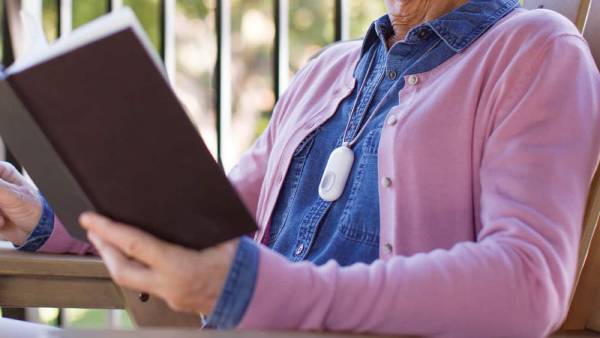
GPS Medical Alert Systems for Specific Needs
Different individuals have different needs when it comes to GPS medical alert systems. Here are some recommendations based on specific needs:
Best GPS Medical Alert Systems for Active Seniors
Active seniors need a GPS medical alert system that can keep up with their lifestyle. These systems should be portable, lightweight, and have a long battery life. They should also have a strong cellular connection to ensure that they work wherever the user goes. An example of such a system is the MobileHelp system, which offers a variety of on-the-go systems that are perfect for active seniors.
Best GPS Medical Alert Systems for At-Home Use
For those who spend most of their time at home, a GPS medical alert system that offers strong in-home coverage is essential. These systems should have a wide range within the home and should be able to connect with the monitoring center even in areas of the house that are far from the base station. The LifeFone At-Home and On-the-Go GPS, Voice-In-Pendant system is a good example of such a system. It offers a wide range within the home and also includes a wearable pendant that allows the user to communicate directly with the monitoring center.
Best GPS Medical Alert Systems for On-the-Go Use
For those who are often on the move, a GPS medical alert system that offers strong cellular coverage and accurate GPS tracking is essential. These systems should be portable and easy to carry, and they should work well even in areas with weak cellular signals. The GreatCall Lively Mobile Plus system is a good example of such a system. It offers strong cellular coverage and accurate GPS tracking, and it is also lightweight and easy to carry.
Best GPS Medical Alert Systems with Fall Detection
Fall detection is a crucial feature for many users of GPS medical alert systems. Systems with this feature can automatically alert the monitoring center if a fall is detected, which can be a lifesaver in situations where the user is unable to press the alert button. The Philips Lifeline GoSafe system is a good example of a system with fall detection. It includes automatic fall detection in all of its on-the-go systems, ensuring that help is always just a button press away.
Remember, the best GPS medical alert system for you or your loved one depends on your specific needs and lifestyle. Always consider these factors when choosing a system.
FAQs on GPS Medical Alert Systems
Here are some frequently asked questions about GPS medical alert systems:
Are GPS Medical Alert Systems Worth It?
Yes, GPS medical alert systems are worth it for many people. They provide peace of mind for both the user and their loved ones, knowing that help can be summoned quickly in an emergency, no matter where the user is. They can be particularly beneficial for seniors who live alone, are at risk of falling, or have medical conditions that could require immediate assistance.
How Do GPS Medical Alert Systems Work?
GPS medical alert systems work by using GPS technology to track the location of the user. When the alert button on the device is pressed, the system sends a signal to a monitoring center with the user’s location information. The monitoring center can then dispatch emergency services to the user’s location if necessary. Some systems also include features like fall detection, which can automatically send an alert if a fall is detected.
Can GPS Medical Alert Systems Be Used in Rural Areas?
Yes, GPS medical alert systems can be used in rural areas, as long as there is a strong cellular signal. The GPS technology used in these systems relies on satellites, which can provide coverage almost anywhere in the world. However, the system’s ability to connect to the monitoring center depends on the cellular network, so it’s important to choose a system that uses a reliable network with good coverage in your area.
Do All Medical Alert Systems Have GPS?
No, not all medical alert systems have GPS. Some systems are designed for use only in the home and do not include GPS tracking. However, many modern medical alert systems do include GPS technology, particularly those designed for on-the-go use.
What Happens If I Lose GPS Signal?
If you lose GPS signal, the medical alert system may not be able to accurately track your location. However, many systems also use cellular technology to help determine your location, so you may still be able to get help if you need it. If you live in an area with weak GPS signal, it may be worth considering a system that also uses other technologies for location tracking.
What is the difference between a mobile medical alert device and a GPS medical alert device?
A mobile medical alert device is a portable device that allows users to call for help both inside and outside their homes. These devices often include GPS technology to help emergency responders locate the user in case of an emergency. A GPS medical alert device specifically refers to a device that uses GPS technology to track the user’s location.
How do emergency responders interact with a personal emergency response system?
When a user triggers their personal emergency response system, the device sends an alert to a monitoring center. The trained operators at the monitoring center then contact emergency responders, providing them with the user’s location and any relevant medical information.
What are some medical alert system options?
When choosing a medical alert system, you have several options. These include in-home systems, mobile systems, systems with fall detection, systems with GPS tracking, and systems with caregiver apps. Some systems also offer additional features like medication reminders and wellness checks.
How are medical alert systems provided to users?
Medical alert systems are typically provided by medical alert companies. These companies offer a range of systems and plans to suit different needs and budgets. Some companies provide the equipment for free and charge a monthly monitoring fee, while others may charge for the equipment as well.
What are mobile systems in the context of medical alert systems?
Mobile systems in the context of medical alert systems refer to portable devices that work anywhere there is cellular coverage. These systems often include GPS tracking and can be used both at home and on the go.
What are GPS medical alerts?
GPS medical alerts are alerts sent from a medical alert device that includes GPS technology. In an emergency, when the user presses the help button, the device sends an alert to the monitoring center along with the user’s GPS location.
What should I look for in a medical alert company?
When choosing a medical alert company, consider factors such as the types of systems offered, the cost, the quality of the monitoring service, the company’s reputation, and the quality of customer service. It can also be helpful to read reviews from other customers.
Testimonials and User Experiences
While it’s not possible to provide specific testimonials or user experiences due to privacy and data protection reasons, it’s clear from various online reviews and feedback that GPS medical alert systems have had a significant impact on users’ lives. Here are some general themes that emerge from user testimonials:
Real Stories from GPS Medical Alert System Users
Many users of GPS medical alert systems share stories of how these systems have helped them in emergencies. For example, some users have reported that the system helped them get immediate help after a fall or medical emergency. Others have shared stories of how the system’s GPS tracking feature helped locate them when they were lost or disoriented.
Impact of GPS Medical Alert Systems on Users’ Lives
GPS medical alert systems have had a profound impact on many users’ lives. Here are some ways these systems have made a difference:
- Increased independence: Many users report that having a GPS medical alert system gives them the confidence to live independently, knowing that help is just a button press away if they need it.
- Peace of mind for loved ones: For family members and caregivers, knowing that their loved one has a GPS medical alert system can provide peace of mind. They can rest easy knowing that their loved one can get help quickly in an emergency, even if they are not there to assist.
- Quick response in emergencies: In many testimonials, users praise the quick response they received when they used their GPS medical alert system in an emergency. They appreciate the prompt assistance from the monitoring center and the quick dispatch of emergency services when needed.
- Helpful customer service: Many users also highlight the helpful customer service they received from their GPS medical alert system provider. They appreciate the responsiveness and professionalism of the customer service team, as well as their patience in answering questions and addressing concerns.
While these are general themes, it’s important to remember that everyone’s experience with a GPS medical alert system will be unique. The best way to find out if a system is right for you is to try it out for yourself. Many providers offer a trial period, allowing you to test the system and see if it meets your needs.
Conclusion and Future of GPS Medical Alert Systems
Recap of the Article
In this comprehensive guide, we’ve explored the world of GPS Medical Alert System. We’ve defined what they are, their importance, and how they work. We’ve also delved into their key features such as real-time location tracking, fall detection, two-way communication, and mobile device compatibility.
We’ve reviewed the top 9 GPS Medical Alert Systems in the market, discussed the factors to consider when choosing a system, and highlighted the best systems for specific needs. We’ve answered frequently asked questions and shared real-life testimonials and user experiences.
The Future of GPS Medical Alert Systems: Trends and Innovations
The future of GPS Medical Alert Systems is promising, with the market projected to reach USD 11.1 billion by 2026, growing at a CAGR of 10.3% during the forecast period. This growth is primarily driven by the increasing geriatric population and the high level of health literacy among older people.
Emerging technologies such as the Internet of Things (IoT) and artificial intelligence (AI) are revolutionizing the medical alert systems market. AI-driven systems, along with predictive analytics, help in automatic fall detection and wanderer control, as well as provide notification to caregivers. The integration of these technologies into GPS Medical Alert Systems will enhance their functionality, making them more efficient and user-friendly.
Moreover, the trend of mobile-based Personal Emergency Response Systems (mPERS) is expected to lead the medical alert systems market in the coming years. mPERS devices provide mobility to senior citizens by allowing them to maintain their independent lifestyle while providing access to the device wherever they go.
Final Thoughts
Choosing the right medical alert system can be a daunting task given the many medical alert companies offering a variety of medical alert devices. The options are vast from mobile medical alert systems to at-home systems, from unmonitored medical alert systems to those with 24/7 monitoring services.
When choosing among the best medical alert systems, it’s crucial to consider your specific needs. If you’re often on the go, a mobile medical alert system or mobile alert systems with GPS medical alert devices might be the best fit. These systems, provided by various medical alert system providers, offer features such as emergency call button, optional fall detection, and emergency support.
For those who spend most of their time at home, at home systems might be a better option. Some of these systems come with medication reminders, a feature that can be particularly useful for individuals managing multiple medications.
In terms of pricing, some companies offer a price lock guarantee, ensuring that your costs won’t increase over time. Others might charge an activation fee in addition to the monthly monitoring service fee.
Innovations in technology have led to the development of GPS systems and GPS devices that enhance the functionality of mobile medical alert devices. Some systems even offer a caregiver app, allowing family members and caregivers to monitor the user’s status and location.
The best medical alert system for you depends on your lifestyle, medical needs, and personal preferences. Whether you’re considering mobile medical alert devices or most medical alert systems, it’s important to do your research, read reviews, and consult with medical alert companies to make an informed decision. Remember, the goal is to enhance safety and independence, providing peace of mind for both the user and their loved ones.
